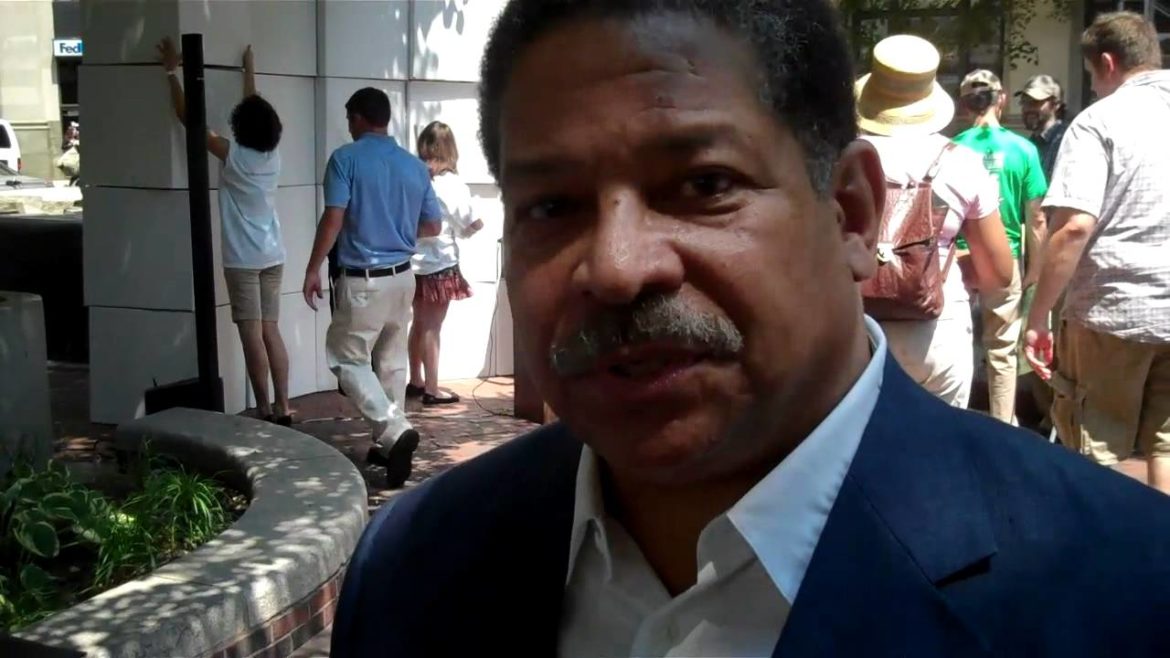By PAULA TRACY, InDepthNH.org
CONCORD – The elimination of uniformed police officers in New Hampshire schools was advocated among other recommendations by a leader of the New England NAACP on Thursday.
Juan Cofield, president of the NAACP New England Area Conference, also recommended hiring more officers of color to be proportional with the communities they serve, and annual public reports released on any civil monetary awards related to police shootings and misconduct.
He also called for more public accountability of police Thursday in testifying in front of the Commission on Law Enforcement Accountability, Community and Transparency.
“We must also demand more of those same police officers who have been given this special authority,” he said, “because police think they can get away without necessary accountability when they engage in misconduct.”
“This is an issue for taxpayers,” Cofield said, and they should know the kinds of financial awards and compensation that come from police misconduct. Cofield said uniformed officers permanently located in schools, commonly known as a school resource officers, “sends the wrong message” and is a “distraction to learning.”
The disciplinarian in a school would still be allowed to call for a police officer to come to a school, he said.
The Commission is charged by Gov. Chris Sununu with coming up with recommendations for change by July 31.
A copy of Cofield’s written testimony is here.
https://www.governor.nh.gov/sites/g/files/ehbemt336/files/inline-documents/sonh/20200708-juan-cofield-naacp-neac-policing-advocacy-issues.pdf
He also called for improved data collection as it relates to police interaction with people of color and to establish a statewide model policy for police use of force. Cofield also recommended the elimination of qualified immunity for police, and to create a statewide set of police standards and a system of de-certification for police misconduct.
John Scippa, director of State Police Standards and Training and a member of the commission, said departments across the state have a hard time recruiting police officers of color and he asked for guidance on how to improve that.
“I think we should plan on some discussions later on,” Cofield said. He noted commission members Rogers Johnson and James McKim, who are NAACP leaders in the Seacoast and Manchester respectively, could be helpful.
He said he was more versed in issues in Massachusetts where he is based rather than in New Hampshire.
Cofield did make a recommendation that departments modify veterans’ preference for police hiring and increase preference for hiring officers of color.
Ahni Malachi, executive director of the New Hampshire Commission on Human Rights and a member of the commission, asked if it might be better to have officers in schools to “bridge that gap” between law enforcement and the community.
“I hear and understand the question,” Cofield said. “People who spend more time in school than any of us are teachers. I think you ought to ask what the teacher’s unions in New Hampshire think. I know what teachers unions in Massachusetts think.”
He said the reason for the police officers to be there is to maintain order in many of the school districts in Massachusetts.
Malachi said her experience as a parent with a uniformed resource officer in a school in the Concord area was very positive and allowed her children to feel comfortable with a police officer and build a relationship. It might also help develop a career path for some children, she noted.
But Malachi noted that that was only her personal experience and things might be different in other communities.
Other members of the commission, including Scippa, noted SROs in New Hampshire provide an important community resource and know who might be struggling at home and need more support. They also provide security, mentorship and provide an integral part of the school system, Scippa said. Scippa was previously the police chief in Stratham.
Ronelle Tsheila, a member of the commission and leader of Black Lives Matter, Manchester, said SRO officer roles need to be more clearly defined as they handle a variety of things. She said the first negative experience she had with the police was with an SRO.
Some questioned why SROs need to be armed, and Scippa said that they have a gun to provide for the security of the students and staff from internal and external threats where they can respond immediately rather than within minutes.
The commission also heard from Capt. William Pease, assessor for the National Commission for Accreditation for Law Enforcement Agencies https://www.calea.org/ which has been recommended as a resource to use in the training of officers in New Hampshire.
They also heard from Michele Holt-Shannon, director of NH Listens, and Brandon Thomas of that organization https://carsey.unh.edu/person/brandon-d-thomas.
NH Listens envisions a state that works together to build strong foundations for communities and to eliminate inequitable practices. It is a partner with Everyday Democracy and Blue and You.
For more information on the commission, visit https://www.governor.nh.gov/accountability
The next meeting of the commission is scheduled for next Wednesday at 12:30 p.m. and next Friday at 9:30 a.m.





